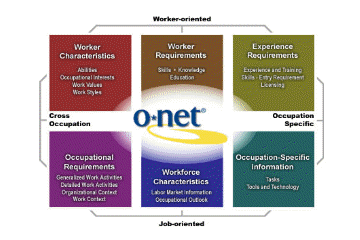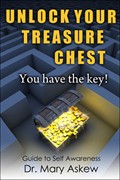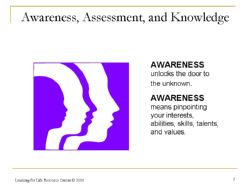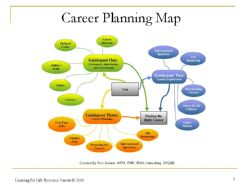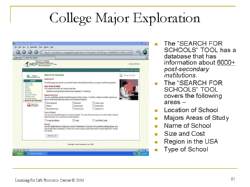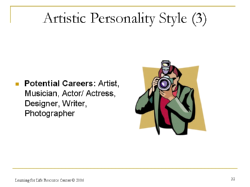Get Downloads to Power Up for 2012
Access your purpose. Lock
in on your destiny. Take
charge of your life by focusing on
your interests, abilities, and skills.
Career Clusters and Holland Codes
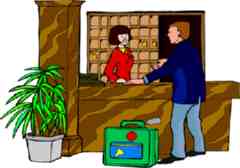
The Career Clusters Resources, the Guide for Occupational Exploration/ GOE Codes, and Holland Codes Connection is a career cluster resource guide that provides information about Career Clusters, Guide for Occupational Exploration/ GOE Codes, Holland Codes, career exploration, career jobs, career salary, career research, and career information.
The Career Clusters, the Guide for Occupational Exploration/ GOE Codes, and Holland Codes Connection provides information on -
- Background of Career Clusters and Guide for Occupational Exploration/ GOE Codes
- Career Clusters, Guide for Occupational Exploration/ GOE Codes, and Holland Codes Cross-Reference Tables 1, 2, and 3
- Table 1: The Career Clusters, Guide for Occupational Exploration Codes (GOE), and the Holland Codes Cross-Reference (Sorted by Holland Codes)
- Table 2: The Career Clusters, Guide for Occupational Exploration Codes (GOE), and the Holland Codes Cross-Reference (Sorted by GEO Interest Area)
- Table 3: The Career Clusters, the Original Guide for Occupational Exploration Codes (GOE), and the Holland Codes Cross-Reference (Sorted by GEO Interest Area)
- Internet Guide for Occupational Exploration and Career Cluster Resources
- State Career Clusters Initiative
- Career Activity Files
- Career Click
- Career Cluster Frameworks
- Career Clusters
- Career Clusters & Pathways
- Career Clusters Series
- Career Prospects System
- Career Voyages
- Career Website for Students
- Cluster and Career Videos
The benefits of the Holland Codes and Career Clusters Resource Posters are -
- Eye appealing - Is a colorful presentation
- Easy to use - Facilitates learning through the use of graphics
- Comprehensive - Shows the relationships between careers, interests, Holland Codes, and Career Clusters
- Easy to understand - Simplifies the understanding of career exploration, Holland Codes, and the Career Clusters
- Easy scoring - Sorts quickly according to likes and dislikes
- Reproducible - Print as many posters as you need
The Holland Code and Career Cluster Resource Posters are used to -
- Provide career exploration classroom activities for middle school students, children, kids, and adults who learn best using visual resources
- Identify Holland Codes and Career Clusters
- Identify characteristics of Holland Personality Types
- Sort occupations according to Holland Codes and Career Clusters
- Over 200 colorful, illustrated posters
- Updated instruction sheets
- Alphabetized poster list
- State Career Clusters/ Pathways Fact Sheet
- Super State Career Clusters/ Pathways Fact Sheet
This Holland Code and Career Clusters resource is an excellent supplement to any career education, counseling, coaching, and exploration program. Use the posters in conjunction with any career cluster or Holland Code resource.
Destiny Discovers Purpose
Activity PAK

The printed activity sheets have -
- Six sections
- 72 items
For the activity sheets, you use paper-and-pencil.
The estimated time to complete the activity sheets is 30 minutes, and activity sheets are self–scoring.
Color Chart

The Color Chart provides information about forty-four careers:
- Job Titles
- Color Career Group
Detectives of the Bible Club
(DBC)

Now is the time to pinpoint your interests, abilities, skills, talents, and values!
Unlock your potential!
Discover who you really are and KNOW your likes, dislikes, and interests.
Match your likes, interests, skills, and personality styles to careers.
Find the right training programs matches your interests.
Succeed in planning a career.
The Detectives of the Bible Club is a fun, interactive way to explore the Word of God.
Each lesson is packed full of activities -
- Bible stories
- Bible verses
- Coloring sheets
- Crossword puzzle
- Solving Cases Sheets
- Bible Word Studies
- Question and answer sheets
Good for Family Bible Studies!
Learn about some of the heroes from the Bible -
- Jesus
- David
- Joshua
- Abraham
- Noah
- Daniel
- Mary
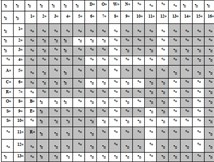
Good Character Building Curriculum!
The Detective of the Bible Club (DBC) has three areas -
- Become a Detective of the Bible
- Learn Hebrew and Greek
- Flash Cards
- Coloring Sheets
- Bingo Cards
- Seek the Holy Spirit
- Fruit of the Spirit
- Building Godly Character
Volume 1: Detectives of the Bible Club Manual
Leaders’ Guide
A Cry from the Heart
Inspector's Pledge of Support
Biblical Guide to Train up a Child
Detectives of the Bible Club Theme Song
Bible Guest - David
Where Is The Story Of David – The Chosen One?
Where Is 1 Samuel 17?
Bible Guest - Jesus Born In Bethlehem
Who Is Jesus?
Where is the Story of a King is Born?
Where Is Luke 2:6 - 7
Bible Guest - Joshua
Where is the Story of a New Leader?
Bible Guest - Jesus at the Age of Twelve
Where is the Story of Boy in the Temple?
Where is Luke 2:46?
The special, illustrated, 383 page PDF Edition comes with -
- Bible stories
- Bible verses
- Coloring sheets
- Crossword puzzle
- Solving Cases Sheets
- Bible Word Studies
- Question and answer sheets
Faith-Based Career Planning Curriculum

The faith based career planning curriculum covers the following areas -
- Holland codes
- Interests, Abilities, and skills
- Careers
- College Majors
- Job Search Resources
- Private Schools
- Homeschool Students
- Youth Groups
- Work Force Programs
- Church Afterschool Programs
- Bible Studies
- Retreats
- Bible Schools
- Three Steps Within the Career Planning and Exploration Process
- Biblical Principles
- Step One: Awareness, Knowledge, and Assessment
- Types of Career Planning Resources
- Examples of Holland Codes Resources
- Holland Career Personalities
- Four Personal Styles
- Biblical Examples for Holland Personality Types
- Holland Code Assessments
- Holland Codes Resource Book
- Activity Sheet for “Holland” Career Assessment
- Biblical Principles
- Step Two: Educational and Occupational Exploration
- Internet Career Exploration Resources
- Career Book Resources
- Biblical Principles
- Step Three: Career Planning
- Holland Codes and College Majors
- Resume Writing
- Resume Writing Web Sites
- Biblical Principles
- Preparing for an Interview
- Interests
- Abilities
- Skills
- Talents
- College major information
- Career job opportunities
- Career education requirements
- Career clusters information
- Transferable skills sets
- What are my vocational interests, abilities, skills, and talents?
- What are the steps that are necessary to develop the interests, abilities, skills, and talents that I possess?
- What are the career goal setting steps that I need to do?
- What career tests are available?
- What college major information is available?
Green Careers and Holland Codes Fact Sheets
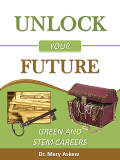
Find Holland Codes for more than 200 green careers in these twelve sectors below.
- Agriculture and Forestry
- Energy and Carbon Capture and Storage
- Energy Efficiency
- Energy Trading
- Environment Protection
- Governmental and Regulatory Administration
- Green Construction
- Manufacturing
- Recycling and Waste Reduction
- Renewable Energy Generation
- Research, Design, and Consulting Services
- Transportation

Green Careers and Holland Codes Poster Collection
Use Green Careers – Unlock Your Future posters as a guide to help you:- Identify interests and Holland Codes
- Match Holland Codes to careers
- Gain awareness of Green Careers
- Agriculture and Forestry
- Energy and Carbon Capture and Storage
- Energy Efficiency
- Energy Trading
- Environment Protection
- Governmental and Regulatory Administration
- Green Construction
- Manufacturing
- Recycling and Waste Reduction
- Renewable Energy Generation
- Research, Design, and Consulting Services
- Transportation
Internet Resources for Teachers, Counselors, and Parents
Children Unlock Treasure Chest, Internet Resources for Teachers, Counselors, Parents, Adults, Kids and Children has information on career exploration web sites and books.There are the different types of Children Unlock Treasure Chest, Exploring Careers Web Sites –
- Curriculum
- Career Information
- Career Groups – Science
- Specific Careers — Science
Career Kid Curriculum Websites
Resource One: Career Cruiser

The Career Cruiser is a career kid site/ guidebook for middle school students. The Career Cruiser has self — assessment activities to match personal interests to careers. The Career Cruiser has information on Holland Codes. Careers are grouped into 16 career clusters. The Career Cruiser has information on occupational descriptions, average earnings, and minimum educational level required for the job.
A Teacher’s Guide is also available.
Resource Two: Elementary Core Career Connection

The Core Career Connections is a career kid collection of instructional activities, K — 6 and 7 — 8, designed by teachers, counselors, and parents. Each grade level has instructional activities that align directly with state department of education requirements. This instructional resource provides a framework for teachers, counselors, and parents to integrate career awareness with the elementary and middle level grade students.
Career Kid Information
Resource Four: Career Ship

Career Shipis a free online career teen exploration tool for middle and high school students.
Career Ship uses Holland Codes and the O*NET Career Exploration Tools.
For each career, Career Ship provides the following information:
- Tasks
- Wages
- Career outlook
- Interests
- Education
- Knowledge
- Skills
- Similar careers
Career Ship is a product a public—service web site providing career, college, financial aid, and financial literacy information and services.
Resource Six: Destination 2020

Destination 2020 helps youth discover how everyday tasks can help them build skills they will need to face the many challenges of the workforce.
Skills are linked to –
- School Subjects
- Other School Activities
- Play Activities At Home
- Work at Home
Through career teen quizzes, activities and articles, students find some answers or, at least, a direction about their future. There are more than 200 profiles of real people who are describing what a day at work is like for them.
Career Kid Career Groups Websites — Science
Resource Eight: EEK! Get a Job – Environmental Education for Kids

Eek! Get a Job – Environmental Education for Kids is a career kid site/ electronic magazine for children in grades 4 — 8. Eek! Get a Job provides information about –
- Forestry
- Hydrogeologist
- Engineering
- Herpetologist
- Park Ranger
- Wildlife Biologist
- Park Naturalist
There is a job description for each career, a list of job activities, suggested activities to begin exploring careers, and needed job skills.
Resource Eleven: San Diego Zoo Job Profiles for Kids

San Diego Zoo is a career kid website that has job profiles. Job Profiles discussed jobs for people who –
- Work with animals
- Work with plants
- Work with science and conservation
- Work with people
- Work that helps run the Zoo and Park
There are activities listed under each area, for example –
- What we do
- What’s cool about this job
- Job challenges
- How this job helps animals
- How to get a job like this
- Practice Being a …
- How to Become a …
Specific Career Kid Websites — Science
Resource Fourteen: About Veterinarians

About Veterinarians is a website that has career kid facts about –
- What is a Veterinarian?
- Veterinary Education
- Roles of Veterinarians
- Employment Outlook
- Becoming a Veterinary Technician
Resource Sixteen: Engineering – The Stealth Profession

Engineering – The Stealth Profession has a lot of career kid information about engineers –
- Types of Engineers
- True Stories
- Salaries
- Education Required
- Work Schedules
- Equipment Used
Resource Eighteen: Do You Want to Become a Volcanologist?

Do You Want to Become a Volcanologist? provides career kid descriptions of the –
- Word ″Volcanologist″
- Daily work
- Traits for success
- Education
- Salaries
ONET and Holland Codes
BenefitsThe benefits of the O*NET Codes and Holland Codes Fact Sheets are -
- Low cost
- Easy to read format
- Comprehensive and detailed lists
- Latest career information
- Links between Holland Codes and O*NET Codes
- Summary of information from reliable source - Occupational Information Network
- Tasks
- Knowledge
- Skills
- Abilities
- Work Activities
- Work Context
- Job Zone
- Interests
- Work Values
DOL/ETA (U.S. Department of Labor, Employment and Training Administration) is the exclusive owner of all rights under U.S. copyright laws and international treaty provisions in the O*NET ™ Career Exploration Tools. Any other copyright notices refer only to Learning for Life Resource Center's original work in the product.
O*NET and O*NET IN IT and logos are trademarks of the DOL/ETA (U.S. Department of Labor, Employment and Training Administration).
Use the O*NET Codes and Holland Codes FACT Sheets lists to compare the O*NET Codes to the careers listed in the Dictionary of Holland Occupational Codes. Save time and effort.
O*NET Codes and Holland Codes FACT Sheets
O*NET Codes and Holland Codes FACT Sheets lists the -
- O*NET-SOC Code
- O*NET-SOC Job Title
- Holland Codes
- Description
O*NET Codes and Holland Codes FACT Sheets lists the -
- O*NET-SOC Code
- O*NET-SOC Job Title
- Holland Codes
O*NET Codes and Holland Codes FACT Sheets - Educational Levels Required for Different Occupations lists the required levels of education from the selected sample. The largest number of people had one of the following levels of education -
- Less than a High School Diploma
- High School Diploma (or GED or High School Equivalence Certificate)
- Post-Secondary Certificate - awarded for training completed after high school (for example, in Personnel Services, Engineering-related Technologies, Vocational Home Economics, Construction Trades, Mechanics and Repairers, Precision Production Trades)
- Some College Courses
- Associate's Degree (or other 2-year degree)
- Bachelor's Degree
- Post-Baccalaureate Certificate - awarded for completion of an organized program of study; designed for people who have completed a Baccalaureate degree, but do not meet the requirements of academic degrees carrying the title of Master.
- Master's Degree
- Post-Master's Certificate - awarded for completion of an organized program of study; designed for people who have completed a Master's degree, but do not meet the requirements of academic degrees at the doctoral level.
- First Professional Degree - awarded for completion of a program that: requires at least 2 years of college work before entrance into the program, includes a total of at least 6 academic years of work to complete, and provides all remaining academic requirements to begin practice in a profession
- Doctoral Degree
- Post-Doctoral Training
O*NET Codes and Holland Codes FACT Sheets - Ability Areas for Different Occupations lists the following Ability Areas -
- Cognitive Abilities — Abilities that influence the acquisition and application of knowledge in problem solvingnformation Ordering — The ability to arrange things or actions in a certain order or pattern according to a specific rule or set of rules (e.g., patterns of numbers, letters, words, pictures, mathematical operations).
- Mathematical Reasoning — The ability to choose the right mathematical methods or formulas to solve a problem.
- Memorization — The ability to remember information such as words, numbers, pictures, and procedures.
- Number Facility — The ability to add, subtract, multiply, or divide quickly and correctly.
- Oral Comprehension — The ability to listen to and understand information and ideas presented through spoken words and sentences.
- Oral Expression — The ability to communicate information and ideas in speaking so others will understand.
- Physical Abilities — Abilities that influence strength, endurance, flexibility, balance and coordination.
- Psychomotor Abilities — Abilities that influence the capacity to manipulate and control objects
- Sensory Abilities — Abilities that influence visual, auditory and speech perception
O*NET Codes and Holland Codes FACT Sheets - Job Zones lists the following Job Zones -
- Job Zone One: Little or No Preparation Needed
- Job Zone Two: Some Preparation Needed
- Job Zone Three: Medium Preparation Needed
- Job Zone Four: Considerable Preparation Needed
- Job Zone Five: Extensive Preparation Needed
- Experience
- Education
- Job Training
- Examples of job skills
- Examples of occupations
O*NET Codes and Holland Codes FACT Sheets - Knowledge Areas lists the following Knowledge Areas -
- Knowledge — Organized sets of principles and facts applying in general domains.
- Administration and Management — Knowledge of business and management principles involved in strategic planning, resource allocation, human resources modeling, leadership technique, production methods, and coordination of people and resources.
- Biology — Knowledge of plant and animal organisms, their tissues, cells, functions, interdependencies, and interactions with each other and the environment.
- Building and Construction — Knowledge of materials, methods, and the tools involved in the construction or repair of houses, buildings, or other structures such as highways and roads.
- Chemistry — Knowledge of the chemical composition, structure, and properties of substances and of the chemical processes and transformations that they undergo. This includes uses of chemicals and their interactions, danger signs, production techniques, and disposal methods.
- Clerical — Knowledge of administrative and clerical procedures and systems such as word processing, managing files and records, stenography and transcription, designing forms, and other office procedures and terminology.
- Communications and Media — Knowledge of media production, communication, and dissemination techniques and methods. This includes alternative ways to inform and entertain via written, oral, and visual media.
- Computers and Electronics — Knowledge of circuit boards, processors, chips, electronic equipment, and computer hardware and software, including applications and programming.
- Customer and Personal Service — Knowledge of principles and processes for providing customer and personal services. This includes customer needs assessment, meeting quality standards for services, and evaluation of customer satisfaction.
- Design — Knowledge of design techniques, tools, and principles involved in production of precision technical plans, blueprints, drawings, and models.
- Economics and Accounting — Knowledge of economic and accounting principles and practices, the financial markets, banking and the analysis and reporting of financial data.
- Education and Training — Knowledge of principles and methods for curriculum and training design, teaching and instruction for individuals and groups, and the measurement of training effects.
- Engineering and Technology — Knowledge of the practical application of engineering science and technology. This includes applying principles, techniques, procedures, and equipment to the design and production of various goods and services.
- English Language — Knowledge of the structure and content of the English language including the meaning and spelling of words, rules of composition, and grammar.
- Fine Arts — Knowledge of the theory and techniques required to compose, produce, and perform works of music, dance, visual arts, drama, and sculpture.
- Food Production — Knowledge of techniques and equipment for planting, growing, and harvesting food products (both plant and animal) for consumption, including storage/handling techniques.
- Foreign Language — Knowledge of the structure and content of a foreign (non-English) language including the meaning and spelling of words, rules of composition and grammar, and pronunciation.
- Geography — Knowledge of principles and methods for describing the features of land, sea, and air masses, including their physical characteristics, locations, interrelationships, and distribution of plant, animal, and human life.
- History and Archeology — Knowledge of historical events and their causes, indicators, and effects on civilizations and cultures.
- Law and Government — Knowledge of laws, legal codes, court procedures, precedents, government regulations, executive orders, agency rules, and the democratic political process.
- Mathematics — Knowledge of arithmetic, algebra, geometry, calculus, statistics, and their applications.
- Mechanical — Knowledge of machines and tools, including their designs, uses, repair, and maintenance.
- Medicine and Dentistry — Knowledge of the information and techniques needed to diagnose and treat human injuries, diseases, and deformities. This includes symptoms, treatment alternatives, drug properties and interactions, and preventive health-care measures.
- Personnel and Human Resources — Knowledge of principles and procedures for personnel recruitment, selection, training, compensation and benefits, labor relations and negotiation, and personnel information systems.
- Philosophy and Theology — Knowledge of different philosophical systems and religions. This includes their basic principles, values, ethics, ways of thinking, customs, practices, and their impact on human culture.
- Physics — Knowledge and prediction of physical principles, laws, their interrelationships, and applications to understanding fluid, material, and atmospheric dynamics, and mechanical, electrical, atomic and sub- atomic structures and processes.
- Production and Processing — Knowledge of raw materials, production processes, quality control, costs, and other techniques for maximizing the effective manufacture and distribution of goods.
- Psychology — Knowledge of human behavior and performance; individual differences in ability, personality, and interests; learning and motivation; psychological research methods; and the assessment and treatment of behavioral and affective disorders.
- Public Safety and Security — Knowledge of relevant equipment, policies, procedures, and strategies to promote effective local, state, or national security operations for the protection of people, data, property, and institutions.
- Sales and Marketing — Knowledge of principles and methods for showing, promoting, and selling products or services. This includes marketing strategy and tactics, product demonstration, sales techniques, and sales control systems.
- Sociology and Anthropology — Knowledge of group behavior and dynamics, societal trends and influences, human migrations, ethnicity, cultures and their history and origins.
- Telecommunications — Knowledge of transmission, broadcasting, switching, control, and operation of telecommunications systems.
- Therapy and Counseling — Knowledge of principles, methods, and procedures for diagnosis, treatment, and rehabilitation of physical and mental dysfunctions, and for career counseling and guidance.
- Transportation — Knowledge of principles and methods for moving people or goods by air, rail, sea, or road, including the relative costs and benefits.
O*NET Codes and Holland Codes FACT Sheets - Skills Areas
Skills may be further divided into basic skills & cross-functional skills -
- Basic skills, such as reading, facilitate the acquisition of new knowledge.
- Cross-functional skills, such as problem solving, extend across several domains of activities.
- Content — Background structures needed to work with and acquire more specific skills in a variety of different domains
- Reading Comprehension — Understanding written sentences and paragraphs in work related documents.
- Active Listening — Giving full attention to what other people are saying, taking time to understand the points being made, asking questions as appropriate, and not interrupting at inappropriate times.
- Writing — Communicating effectively in writing as appropriate for the needs of the audience.
- Speaking — Talking to others to convey information effectively.
- Mathematics — Using mathematics to solve problems.
- Science — Using scientific rules and methods to solve problems.
- Process — Procedures that contribute to the more rapid acquisition of knowledge and skill across a variety of domains.
- Critical Thinking — Using logic and reasoning to identify the strengths and weaknesses of alternative solutions, conclusions or approaches to problems.
- Active Learning — Understanding the implications of new information for both current and future problem-solving and decision-making.
- Learning Strategies — Selecting and using training/instructional methods and procedures appropriate for the situation when learning or teaching new things.
- Monitoring — Monitoring/Assessing performance of yourself, other individuals, or organizations to make improvements or take corrective action.
- Social Skills — Developed capacities used to work with people to achieve goals
- Social Perceptiveness — Being aware of others' reactions and understanding why they react as they do.
- Coordination — Adjusting actions in relation to others' actions.
- Persuasion — Persuading others to change their minds or behavior.
- Negotiation — Bringing others together and trying to reconcile differences.
- Instructing — Teaching others how to do something.
- Service Orientation — Actively looking for ways to help people.
- Complex Problem Solving Skills — Developed capacities used to solve novel, ill-defined problems in complex, real-world settings.
- Complex Problem Solving — Identifying complex problems and reviewing related information to develop and evaluate options and implement solutions.
- Technical Skills — Developed capacities used to design, set-up, operate, and correct malfunctions involving application of machines or technological systems.
- Operations Analysis — Analyzing needs and product requirements to create a design.
- Technology Design — Generating or adapting equipment and technology to serve user needs.
- Equipment Selection — Determining the kind of tools and equipment needed to do a job.
- Installation — Installing equipment, machines, wiring, or programs to meet specifications.
- Programming — Writing computer programs for various purposes.
- Operation Monitoring — Watching gauges, dials, or other indicators to make sure a machine is working properly.
- Operation and Control — Controlling operations of equipment or systems.
- Equipment Maintenance — Performing routine maintenance on equipment and determining when and what kind of maintenance is needed.
- Troubleshooting — Determining causes of operating errors and deciding what to do about it.
- Repairing — Repairing machines or systems using the needed tools.
- Quality Control Analysis — Conducting tests and inspections of products, services, or processes to evaluate quality or performance.
- Systems Skills — Developed capacities used to understand, monitor, and improve socio-technical systems.
- Judgment and Decision Making — Considering the relative costs and benefits of potential actions to choose the most appropriate one.
- Systems Analysis — Determining how a system should work and how changes in conditions, operations, and the environment will affect outcomes.
- Systems Evaluation — Identifying measures or indicators of system performance and the actions needed to improve or correct performance, relative to the goals of the system.
- Resource Management Skills — Developed capacities used to allocate resources efficiently.
- Time Management — Managing one's own time and the time of others.
- Management of Financial Resources — Determining how money will be spent to get the work done, and accounting for these expenditures.
- Management of Material Resources — Obtaining and seeing to the appropriate use of equipment, facilities, and materials needed to do certain work.
- Management of Personnel Resources — Motivating, developing, and directing people as they work, identifying the best people for the job.
Rainbow Career Awareness System
See Rainbow Careers is a fun way to introduce children to careers. Careers are like rainbows. The world is filled with 1000's of careers.Open your child's eyes to the wonderful world of careers.
Discover your child's career interests. Learn about how careers are broken up into six career groups.
The Elementary School Career Exploration Kit contains the following items -
- Book (iPhone/ iPad App) with following separately sold items -
- Unit Plan
- Instruction Sheet
- Question and Answer Sheets
- Career Activity Sheets
- Color/ Career Chart
- Posters
See Rainbow Careers Career Book, and
iPod/ iPad App
The See Rainbow Careers book is now available at the iTunes store.
The See Rainbow Careers book -
- Has six sections and 40 colorful pages
- Provides information about –
- Career group characteristics
- Career interest areas
- Careers
- Uses vibrant colors, animated graphics, and VISUAL learning techniques to help children build an career awareness
- Clarifies thoughts, integrates new knowledge, and promotes critical thinking. New concepts are more thoroughly and easily understood.
- Organizes and analyzes information.
- Improves –
- Attention Span and Concentration: holds audience's attention and helps people absorb information
- Memory Skills and Understanding: improves ability to absorb information
- Speed of Learning: reduces the time it takes to complete career tests.

Children, youth, and adults -
- See how colors are connected to careers
- Realize how careers can be grouped and organized
- Home
- Schools
- Boys and Girls Clubs
- YMCA/ YWCA Programs
- Afterschool Programs
- Kids Go To Work Days
- Career Days
- Summer School Programs
- Who are In ESL/GED programs
- Who have limited reading ability
- Who have limited knowledge of English
- Who are developmentally delayed
- Who are learning disabled
- Who have special needs
- Who have limited access to education
- Who are chronically unemployed
Order the See Rainbow Careers iTunes App at the iTunes store.
Unit Plan, Instruction Sheets, and Question and Answer Sheets
Reference Materials include Unit Plan, Instruction Sheets, and Question and Answer Sheets.
The Unit Plan covers -
- Standards
- Performance Goals
- Academic Content Area(s)
- Unit Assessment
- Brief Summary
- References
The Question and Answer Sheets is an excellent review for the information covered in the See Rainbow Careers book. Summarize key information concurrently, or use the sheets as a review.
Activity Sheets

The printed activity sheets have -
- Six sections
- 72 items
For the activity sheets, you use paper-and-pencil.
The estimated time to complete the activity sheets is 30 minutes, and activity sheets are self–scoring.
Color Chart

The Color Chart provides information about forty-four careers:
- Job Titles
- Color Career Group
Posters

Over three hundred (300) posters feature graphics, interest areas, and careers. The posters are easy scoring. You sort the posters quickly according to likes and dislikes. At the end of the poster sorting exercise, you will have your Holland Code. The posters are an excellent way to explore careers. The poster shows you’re the relationship between Holland Codes and careers.
Bingo Cards Sets
The purpose of the Bingo Cards are to help the students:
- Discover their interests, abilities, and skills.
- Find out what makes their personality tick.
- Explore careers with middle school students, children, and kids.
- Link careers to interests, abilities and skills.
- Bingo Card Set
- Bingo Master
- Bingo Master Cutouts
- Bingo Instruction Sheet
Rainbow Career Awareness System
Entire Career Awareness System contains -- Unit Plan
- Instruction Sheet
- Question and Answer Sheets
- Activity Sheets
- Bingo Cards
- Color/ Career Chart
- Posters
Unlock Your Treasure Chest
Find the right career!
Now is the time to pinpoint your interests, abilities, skills, talents, and values!
Unlock your potential!
Discover who you really are and KNOW your likes, dislikes, and interests.
Match your likes, interests, skills, and personality styles to careers.
Find the right training programs matches your interests.
Succeed in planning a career.

The Unlock the Treasure Chest. You Have the Keys! Guide to Career Planning is a step-by-step guide to explore careers and college majors. Use the guidebook to pinpoint your interests, abilities, skills, talents, and values.
- Discover who you really are and KNOW your likes, dislikes, and interests.
- Match your likes, interests, skills, and personality styles to careers.
- Find training programs that are a match to the careers that they are interested.
- Succeed in planning a career.
Teachers, you have a classroom activities that is the resource for preparing career and college major exploration classes.
The Unlock the Treasure Chest. You Have the Keys Guide to Career Planning is used in conjunction with the My Career Profile. Dr. Frank Minor, CEO of Career Dimensions has endorsed the Unlock the Treasure Chest. You Have the Keys. Guide to Career Planning.
The Unlock the Treasure Chest has 4 sections –
- Awareness, Assessment, and Knowledge Parent and Teacher Guide
- Guide to Career Exploration and Planning
- Internet Resources for Teachers, Counselors, Parents, Adults, and Teens
- Visual Aids or Screenshots from the Unlock the Treasure Chest Guidebook
Awareness, Assessment, and Knowledge Parent, Teacher, and Adult Guide outlines the process of selecting a career assessment. The selection process includes –
- Introduction to Career Planning
- Steps to Self Awareness
- Tools To Assess Self Awareness
- Selection of a Career Assessment or Test
- Career Test Checklist
- Features Of Career Self Assessments Tests
The topics included in the Guide are -
- Career Planning Map
- Self-Analysis, Self Awareness, or Self Assessment
- Self Awareness
- Tools to Awareness
- Interests Inventory
- Values Inventory
- Skills Inventory
- Personality Styles Inventory
- Career Match Making Using Interests, Values, Skills, and Personality Styles
- Career Exploration
- Database of 1200+ careers
- Research A Career Tool
- Career Profile
- Research career information
- Overview
- Skills
- Values
- Outlook
- Earning
- Interest Profile
- Working Conditions
- Contact Info
- Areas of Study
- Search for Schools
The College Major Exploration section has -
- Database of 6000+ Schools
- Career Exploration Tool
- College Majors Exploration Tool
- Location of School
- Majors Areas of Study
- Name of School
- Size and Cost
- Region in the USA
- Type of School
- Holland Code Career Assessment Activities
- Awareness, Assessment, and Knowledge Resources
- Career Exploration Sites
- College Majors Exploration Resources
The Visual Aids or Screenshots from the Unlock the Treasure Chest Guidebook are an additional bonus for teachers and counselors. These screenshots are excellent for group presentations. The screenshots present the concepts covered in the Guidebook. With each purchase, you will receive PDF and Powerpoint versions of the Visual Aids. The Unlock the Treasure Chest. You Have the Keys. Guide to Career Planning is a toolkit for teachers or counselors preparing students for graduation and transition into post-secondary training programs.
Get the keys from our download library.
